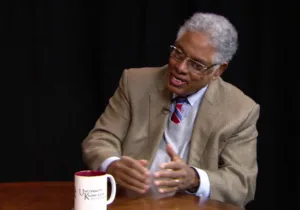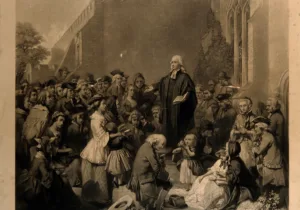Economic justice and stability are of universal human concern, effecting every aspect of our social and political order. During the Cold War, ideological battles raged across the world over which system, Capitalism or Communism, was ultimately more conducive to human flourishing. When the Cold War ended in the early 1990s it was thought that these questions were settled: capitalism, and particularly globalized capitalism, appeared to have won completely and the end of history was in sight. This was not to be, however, and today people still legitimately gripe about the injustices of capitalist greed while also rightly fearing the alternative tyranny of Communism as exemplified in Russia, China, and North Korea. Reinhold Niebuhr was acutely aware that we are always steering between a “Scylla and Charybdis,” of tyrannical socialism and indifferent laissez faire. The loss of liberty is the price we pay in seeking economic equality, but the loss of equality is the price we pay for uninhibited economic liberty. What then, is the solution?
It is a never-ending balancing act. On the one hand, an ever-conscientious plea for equality, fostered by religious values, and guided by political parties that cherish them. This will help reign in the capitalist racehorses that can often trample the common man. On the other hand, an ever-vigilant caution that freedom is always necessary to the health, prosperity, and vitality of a nation. This too must find its place in our religion and politics. There will always be need for rebalancing ourselves, according to the flow of a market which we cannot, and should not, wholly restrain.
Economically, this means that free trade is better than fixed trade. It seems that it always has been, and it always will be. It is true that a free market is not always a fair market, because humans, when given freedom in anything, will inevitably abuse it selfishly. We see this in excessive prices, in great economic powers becoming even more dominant and threatening. Government is required to curtail abuses, preventing commercial fraud and theft wherever it rears its ugly head. Freedom is never completely free if it doesn’t adhere to a moral law which compels restraint. The testimony of Jesus to the rich man (Matthew 19:26-30) is a vital reminder beyond the power and reach of government. Money is something we sacrifice towards the end of pleasing God, not a thing to be worshipped itself. We can grow prosperous and wealthy by free trade, but as John Wesley once said, we must reflect wisely how we can “gain all we can, save all you can, give all you can.” Jesus’s reminder to the rich man was that he had gained and saved, but he was not willing to give back. While awaiting Christ’s return we must rely on government for justice, but if we internalize the Christian spirit of a just economic ethic, wherever possible, we will need to rely on government less. Realism acknowledges this process will never be complete.
A fixed economy, in the model of socialist thinking, mistakenly conflates two economic powers: regulatory and productive. The regulatory power of government should never be combined with the productive power of business, for not only is this a conflict of interest, but the agglomerated power which ensues is unchecked, unjust, and inefficient. We have seen it in Soviet Communism, and elsewhere, that when there are no limits on productive and regulatory powers, tyranny is an almost inevitable consequence. In popular terms, it is like asking the referees of any professional sport to take off their striped shirts and put on the jerseys of the players, and yet remain a referee. Everyone would agree in sports that it is an absurd idea that referees should play the game they are policing. The more we ask government to do the same in business, the greater hazard we risk to all interests. Checks and balances, separation of powers have a purpose. Conversely, asking for no government role at all is as naïve as expecting a sporting match with no referees to be fair and fun.
The current fascination with socialism waxes whenever capitalist inequality becomes egregious. If inequities due the commercial imbalance of power are never redressed, the temptation to take more drastic socialist action grows. This takes us into the concern for our political house of order. Theoretically, there is perfect justification for both a viable Democratic and Republican party. It is not very clear, however, how well either party is serving its essential function. Reflecting upon Reinhold Niebuhr we can suggest what the roles of each party might be. Niebuhr argued that “liberty and equality are just as much in contradiction as they are complementary to each other. A society can destroy liberty in its search for equality; it can annul the spirit of equal justice by a too consistent devotion to liberty.” He also noted “whether a democracy should be defined primarily in terms of liberty or equality is a source of unending debate.” Simply put, in the first case the Soviet Union destroyed freedom by a forcible imposition of a false equality. In the second case, an unfettered capitalist greed can undermine the value of equality, which is a prerequisite for fair and equal treatment. It leads us back to the rich man who had idolized his wealth and refused to part with it for Christ’s sake. Theoretically, then, this writer imagines the Republican party as serving the need to protect the interest of freedom, both personal and economic. The Democrats, hypothetically, could serve the need to restore equality; for raw power aggrandizes, and can be easily abused, in the hands of selfish men. We need to remember power’s purpose: to serve a greater prosperity and justice. Wistfully, then, one can imagine this, but it is a sad state that it is not so immediately evident in our politics.
So, what have we learned? Democracy believes that government “of the people, by the people, and for the people,” is best accomplished where powers are divided and just. An economy that is “of the people, by the people, and for the people” will be neither wholly laissez faire, nor Communistic. It must be perpetually rebalanced, and its powers firmly divided and checked to avoid abuse. Economic power will never be so democratized to make all persons equal on the economic playing field, but neither must it be too centralized to defy their meaningful, free, and prosperous participation in it. Religious values must serve the political conscience for restoring equality, as realism reminds us that this project will never be complete. In short, if opposing political parties had this transcendent wisdom guiding them, they would realize that they have a common cause to provide balance to an economic world which will never be wholly unfettered, nor determined, by their policies.







 Sponsor a student for Christianity & National Security 2024
Sponsor a student for Christianity & National Security 2024